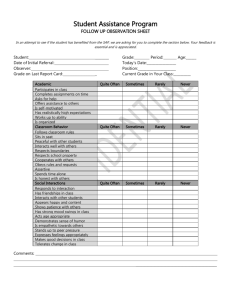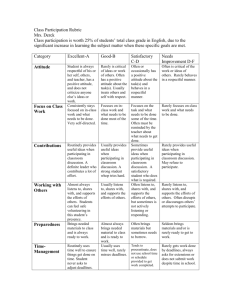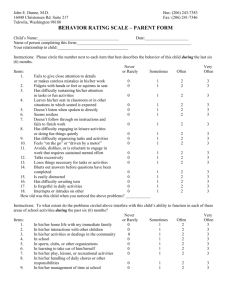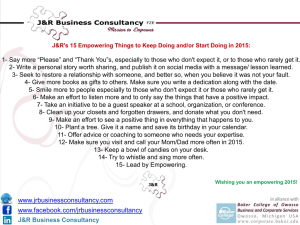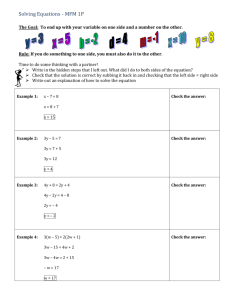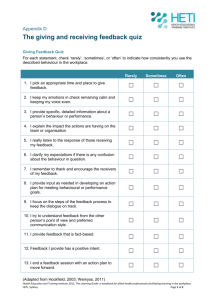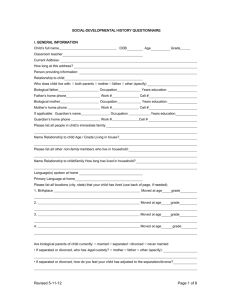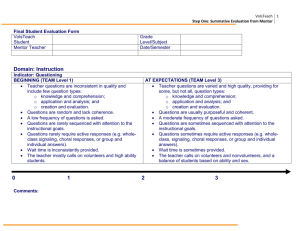The assistant principal, student support specialist, or coordinator of a
advertisement
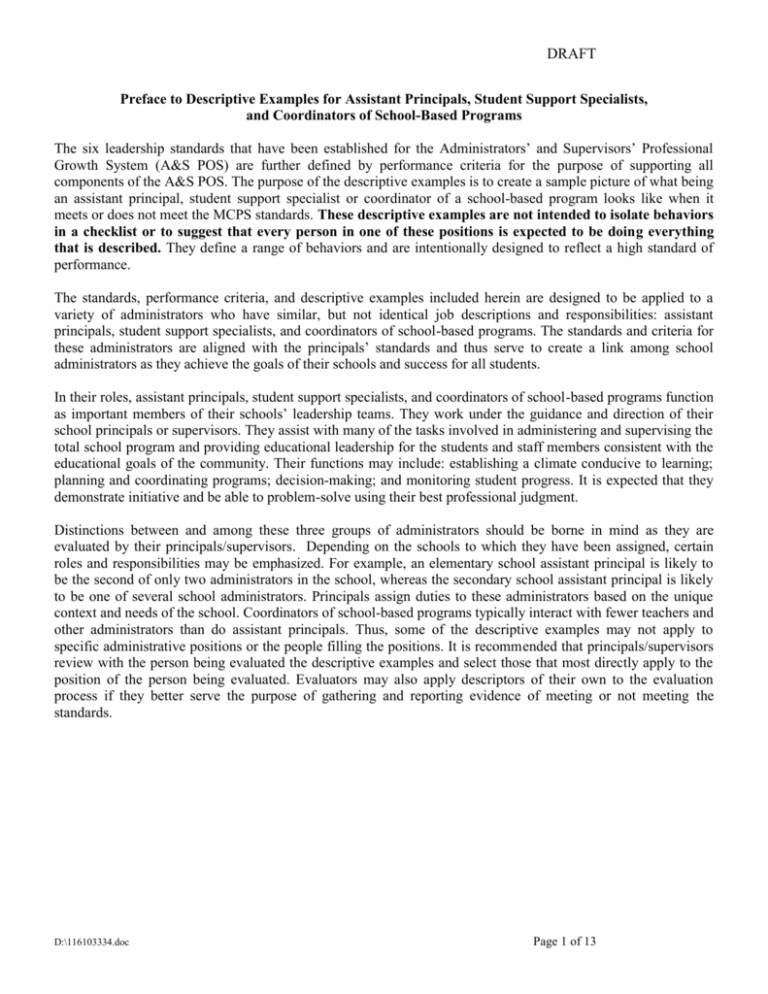
DRAFT Preface to Descriptive Examples for Assistant Principals, Student Support Specialists, and Coordinators of School-Based Programs The six leadership standards that have been established for the Administrators’ and Supervisors’ Professional Growth System (A&S POS) are further defined by performance criteria for the purpose of supporting all components of the A&S POS. The purpose of the descriptive examples is to create a sample picture of what being an assistant principal, student support specialist or coordinator of a school-based program looks like when it meets or does not meet the MCPS standards. These descriptive examples are not intended to isolate behaviors in a checklist or to suggest that every person in one of these positions is expected to be doing everything that is described. They define a range of behaviors and are intentionally designed to reflect a high standard of performance. The standards, performance criteria, and descriptive examples included herein are designed to be applied to a variety of administrators who have similar, but not identical job descriptions and responsibilities: assistant principals, student support specialists, and coordinators of school-based programs. The standards and criteria for these administrators are aligned with the principals’ standards and thus serve to create a link among school administrators as they achieve the goals of their schools and success for all students. In their roles, assistant principals, student support specialists, and coordinators of school-based programs function as important members of their schools’ leadership teams. They work under the guidance and direction of their school principals or supervisors. They assist with many of the tasks involved in administering and supervising the total school program and providing educational leadership for the students and staff members consistent with the educational goals of the community. Their functions may include: establishing a climate conducive to learning; planning and coordinating programs; decision-making; and monitoring student progress. It is expected that they demonstrate initiative and be able to problem-solve using their best professional judgment. Distinctions between and among these three groups of administrators should be borne in mind as they are evaluated by their principals/supervisors. Depending on the schools to which they have been assigned, certain roles and responsibilities may be emphasized. For example, an elementary school assistant principal is likely to be the second of only two administrators in the school, whereas the secondary school assistant principal is likely to be one of several school administrators. Principals assign duties to these administrators based on the unique context and needs of the school. Coordinators of school-based programs typically interact with fewer teachers and other administrators than do assistant principals. Thus, some of the descriptive examples may not apply to specific administrative positions or the people filling the positions. It is recommended that principals/supervisors review with the person being evaluated the descriptive examples and select those that most directly apply to the position of the person being evaluated. Evaluators may also apply descriptors of their own to the evaluation process if they better serve the purpose of gathering and reporting evidence of meeting or not meeting the standards. D:\116103334.doc Page 1 of 13 DRAFT Standard I: Each assistant principal, student support specialist, and coordinator of a school-based program is an educational leader who promotes success for all students as he/she assists in facilitating the development, articulation, implementation, and stewardship of a vision of teaching and learning shared and supported by the school community. Performance Criteria 1. Promotes the school community’s shared vision of teaching and learning that supports achievement for all students. 2. Actively engages in a collaborative process that involves all stakeholders in the development, articulation and implementation of a shared vision. 3. Facilitates the development of the leadership capacity of stakeholders to share the responsibility of the work of the school improvement process toward the realization of the vision. 4. Shares the responsibility in using data for the alignment of the school improvement planning process with the MCPS Strategic Plan. 5. Aligns programs, practices, and resources to support the teaching and learning process. 6. Facilitates an ongoing collaborative process to monitor, evaluate, and revise programs and practices based on multiple sources of data. 7. Fosters a shared commitment to high standards of teaching and learning with high expectations for achievement for all. Examples of evidence of facilitation, articulation, implementation, and monitoring The assistant principal, student support specialist, or coordinator of a school-based program… Meets Standard Assists in facilitating an annual, collaborative process for developing and refining the school’s vision of high standards of teaching and learning with all stakeholders Assists the principal or supervisor by meeting with the community to facilitate their understanding of and garner their support for practices which keep the school’s vision in the forefront in collaborative decision-making Participates in team/department meetings to share and discuss the school’s vision; works with staff to facilitate understanding and support of the school’s goals, objectives, and tasks in the school improvement plan (SIP) Encourages staff to become involved in school decision-making; works with teams/departments to facilitate their involvement Explains the school’s vision to students using ageappropriate language D:\116103334.doc Does Not Meet Standard Provides limited or no assistance in facilitating a collaborative process for annual review of the vision; discourages or ignores stakeholder input Rarely or never meets with the community to facilitate their understanding of and garner their support for practices which keep the school’s vision in the forefront Rarely participates in team/department meetings; minimally shares or discusses the school’s vision; does not work with staff to facilitate understanding and support of the school’s goals, objectives, and tasks in the SIP Provides limited or no encouragement to staff to become involved in school decision-making; efforts to work with teams/departments to facilitate their involvement are limited Rarely or never explains the school’s vision to students using age-appropriate language Page 2 of 13 DRAFT Uses relevant demographic and achievement data in supporting the school’s vision; analyzes and presents data from a variety of sources as they relate to student achievement and school improvement; works with teams/departments to interpret and use data to make instructional improvements Sends key belief messages to students, staff, and parents that: Learning is important All students can learn We must not give up on students and their learning Effective effort leads to student achievement Works with teams/departments to facilitate clear understanding of appropriate, measurable goals for student learning, and to align expectations and goals with standards; works with teams/departments to develop plans for monitoring progress toward team/department/school goals; assists in monitoring progress Facilitates discussions during team/department meetings that are focused on goals, expectations, and the school’s vision Assists teams/departments in collecting relevant data and analyzing and presenting the data to stakeholders Participates actively in the school improvement process team; assists the principal or supervisor by focusing team meetings/discussions on the school’s vision and MCPS’ strategic plan Assists the principal or supervisor in monitoring, evaluating, and revising the school’s improvement process plan on an ongoing basis; assists in revising school goals collaboratively using MCPS’ strategic plan at all stages Assists the principal in working collaboratively with stakeholders to develop a process to overcome the obstacles to achieving the school’s vision of high standards of teaching and learning; discusses with the principal obstacles to the process that he/she observes Assists the principal or supervisor by using a variety of methods to communicate progress with stakeholders about practices and accomplishments D:\116103334.doc Rarely uses relevant demographic and achievement data in supporting the vision; rarely or never analyzes nor presents data; rarely or never works with teams/departments to interpret and use data to make instructional improvements Sends messages to students, staff, and parents that do not support student learning; communications convey that these messages are important for some groups, but not others Provides limited assistance to teams/departments in facilitating understanding; provides limited assistance in aligning expectations and goals with standards; provides minimal assistance to teams/ departments in developing plans for monitoring progress toward goals; provides limited assistance in monitoring progress Provides limited opportunities for discussions at team/department meetings that are focused on goals, expectations, and the school’s vision Provides limited assistance to teams/departments in collecting, analyzing, and presenting data Participation in the school improvement process team is limited; rarely or never assists in focusing team meetings/discussions on the school’s vision and MCPS’ strategic plan Provides limited or no assistance in monitoring, evaluating, and revising the school’s improvement process plan; rarely or never uses a collaborative process while assisting in revising school goals; pays limited or no attention to MCPS’ strategic plan Provides limited or no assistance in working collaboratively with stakeholders to develop a process to overcome obstacles to achieving the school’s vision of high standards of teaching and learning; takes no action when he/she observes obstacles in place Rarely or never provides assistance; repertoire of methods to communicate progress is limited Page 3 of 13 DRAFT Standard II: Each assistant principal, student support specialist, and coordinator of a school-based program is an educational leader who promotes success for all students as he/she nurtures and sustains a school culture of high expectations, professional growth, and an instructional program conducive to student learning. Performance Criteria 1. Demonstrates and promotes high expectations for the achievement of all students. 2. Promotes a school climate focused on teaching and learning. 3. Articulates, supports, and monitors the effective implementation of curriculum, assessment, and instruction – all of which are evidenced in student outcomes. 4. Shares the leadership responsibility for the continuous improvement of instruction through a collaborative, data-driven analysis of student learning. 5. Encourages the use of adult learning concepts and professional development processes to build a professional learning community. 6. Promotes a school climate that values intellectual curiosity and recognizes the diverse needs and strengths of learners. 7. Shares the responsibility for the quality implementation of the professional growth systems for all staff. Examples of evidence of high expectations for student learning and staff professional growth The assistant principal, student support specialist, or coordinator of a school-based program… Meets Standard Works with team/department leaders to create an atmosphere that encourages all students to excel; looks for evidence of recognition of student work and academic progress in classrooms and hallways; looks for evidence of contributions of students from diverse backgrounds Works with teams/departments to interpret and discuss achievement data and progress toward meeting school improvement plan (SIP) goals Uses classroom observations and walk-throughs to monitor instruction in support of attainment of MCPS assessment targets for all groups of students (e.g., racial/ethnic group membership, gender, disabilities, socioeconomic background, English language fluency) Uses classroom observations and monitors formative assessment data to ensure that teachers use instruction that aligns with MCPS curriculum; works with team/department leaders to interpret MCPS curriculum guidelines D:\116103334.doc Does Not Meet Standard Rarely or never works with team/department leaders to create an atmosphere that encourages all students to excel; rarely or never looks for evidence of recognition of student work and academic progress; rarely or never looks for evidence of contributions of students from diverse backgrounds; allows contributions of only some groups of students to be displayed Rarely or never works with teams/departments to discuss achievement data; rarely or never discusses progress toward meeting SIP goals; provides limited or inadequate interpretations of data Neither uses classroom observations nor walkthroughs to monitor instruction in support of attainment of the targets for all groups of students Neither uses classroom observations nor monitors formative assessment data; allows teachers to use instruction that does not align with MCPS curriculum; rarely works with team/department leaders to interpret MCPS curriculum guidelines Page 4 of 13 DRAFT Uses post-observation conferences to emphasize the importance of high expectations for the achievement of all students; uses post-observation conferences to emphasize the need for employing a variety of instructional strategies to respond to the diverse learning needs and strengths of students Provides time during team/department meetings to discuss MCPS assessment targets for all groups of students and to emphasize the importance of high expectations for the achievement of all students Exhibits skill in Observing and Analyzing Teaching (OAT) language, format, and principles in classroom observations, conferences, and monitoring curriculum implementation; provides focused feedback to teachers Assists the principal or supervisor in monitoring the school’s progress over time in meeting state and county performance standards such as attendance, graduation rates, and assessments included in the system of shared accountability Assists the principal or supervisor in sharing student progress/achievement data with parents and the community; solicits input from them regarding improvement Uses available technology (e.g., data warehouse, SIMS, IMS) to monitor curriculum implementation and student progress; works with team/department leaders to facilitate their understanding and use of technology for data analysis Provides time during team/department meetings for staff to analyze and discuss multiple sources of data and information to monitor student achievement and plan for improvement Provides opportunities during team/department meetings for faculty discussions of and reflections on research; encourages staff to learn and pursue effective practices that focus on student learning; keeps staff informed of professional development opportunities Works with the staff development teacher (SDT) to support job-embedded staff development for teachers through a variety of methods (e.g., staff meetings, peer visits with reflection, SDT training sessions, study groups, action research, professional development days) D:\116103334.doc Rarely or never uses post-observation conferences to emphasize the importance of high expectations; rarely or never uses post-observation conferences to emphasize the need for employing a variety of instructional strategies Rarely or never provides time during team/departmint meetings to discuss MCPS assessment targets for all groups of students; rarely or never uses meeting time to emphasize the importance of high expectations for the achievement of all students Does not exhibit skill in OAT language, format, and principles in classroom observations, conferences, and monitoring curriculum implementation; does not provide focused feedback to teachers Rarely or never assists the principal or supervisor in monitoring the school’s progress over time in meeting state or county performance standards Shares neither student progress nor achievement data with parents and the community; rarely or never solicits input from parents and the community Rarely or never uses available technology to monitor curriculum implementation and student progress; rarely or never works with team/department leaders to facilitate their understanding and use of technology for data analysis Rarely or never provides time during team/departmint meetings for staff to analyze and discuss multiple sources of data and information to monitor student achievement and plan for improvement Rarely or never provides opportunities for discussion or reflection; rarely or never encourages staff to learn and pursue effective practices that focus on student learning; does not provide staff with information about opportunities Rarely or never works with the staff development teacher, or works in a limited way to support jobembedded staff development for teachers Page 5 of 13 DRAFT Standard III: Each assistant principal, student support specialist, and coordinator of a school-based program is an educational leader who promotes success for all students as he/she shares the responsibility for the management of the organization, operations, and resources for a safe, efficient, and effective learning environment. Performance Criteria 1. 2. 3. 4. Coordinates people and efforts to improve educational and support processes to achieve targeted results. Develops and/or supervises efficient processes in order to maximize time for instructional leadership. Manages human and material resources to cultivate and support a safe and healthy school environment. Shares the responsibility for aligning resources with the school improvement plan and the strategic plan of the school system. 5. Helps to expand the capacity of the organization and staff to respond to the needs of students in a rapidly changing school environment. Examples of evidence of management of processes, practices, and resources The assistant principal, student support specialist, or coordinator of a school-based program… Meets Standard Uses a research-based, systemic process (e.g., Framework for Teaching and Learning, Baldrige, ten-step process, etc.) with MCPS look-fors to assist in guiding continuous improvement; assists in ensuring that the process is ongoing Shares responsibility for implementing established processes to supervise staff effectiveness on established performance criteria Assists in delegating responsibilities to a variety of appropriate staff Shares responsibility for effectively implementing established testing protocols Supports a master schedule with a balanced program of learning opportunities for all students; assists in monitoring assignment of students to classes/staff that best meet students’ needs Assists in organizing instructional teams/support groups to meet student needs Assists in selecting and developing instructional team leaders who have the capacity to motivate others, make decisions, and create change; assists in developing leadership from within the school’s staff Does Not Meet Standard Does not use a research-based, systemic process to assist in guiding continuous improvement; rarely or never assists in ensuring that the process is ongoing; rarely or never uses MCPS look-fors Inadequately implements established processes Rarely or never assists in delegating responsibilities Inadequately implements testing protocols; inadequately addresses violations of protocol Rarely or never supports a master schedule with a balanced program of learning opportunities for all students; rarely or never assists in monitoring assignment of students to classes/staff Rarely or never assists in organizing instructional teams/support groups to meet student needs Rarely or never assists in selecting and developing instructional team leaders who have the capacity to motivate others, make decisions, and create change; rarely or never assists in developing leadership from within the school’s staff Assists in evaluating programs in the school for their Rarely or never assists in evaluating programs in the relevance to the school improvement plan (SIP); uses school for their relevance to the SIP; rarely or never available data for continuous program evaluation uses available data to evaluate programs Uses technology tools (e.g., spreadsheets, scheduling Rarely or never uses technology tools to assist in D:\116103334.doc Page 6 of 13 DRAFT software, financial software, behavior management software, the data warehouse) to assist in managing school operations and streamline tasks; works with team/department leaders to enhance their understanding of the technology tools Works with team/department leaders and other stakeholders to support clear and comprehensive attendance and behavior management processes that result in increased teaching and learning Shares responsibility for implementing clear expectations and responsibilities for staff in responding to school safety and student discipline matters Assists in conducting emergency drills (e.g., fire, code blue, code red) that are in conformance with regulations provided by the Montgomery County Fire Marshal Meets with on-site emergency team (OSET) to support implementation of effective emergency/ crisis plans Assists in providing direction to building services and security staff (if applicable) to maintain a clean and safe building Assists in monitoring implementation of health/safety regulations Assists in monitoring bus schedules, loading, and unloading Supports funding priorities (human and material) that align with the instructional program and school improvement goals; works with team/department leaders to facilitate understanding of the priorities Recognizes the evolving needs of the school (e.g., changes in the student population, condition of the physical plant) and works with principal or supervisor to plan to address these needs Shares responsibility for providing structures and processes that promote effective communication and timely resolution of conflicts; assists in establishing and maintaining regular procedures whereby students and stakeholders are able to communicate concerns Applies change theory principles to support collaborative decision making D:\116103334.doc managing operations and streamline tasks; rarely or never works with team/department leaders to enhance their understanding Rarely or never works with team/department leaders and other stakeholders to support clear and comprehensive attendance and behavior management processes; does not act on attendance or behavior issues that interfere with classroom instruction and learning Rarely or never shares responsibility for implementing clear expectations and responsibilities for staff in responding to school safety and student discipline matters Rarely or never assists in conducting drills; devotes limited attention to ensuring that drills comply with emergency drill regulations Rarely or never meets with OSET; provides limited or no support to implementation of effective emergency/crisis plans Rarely or never provides direction to building services and security staff; inadequately monitors the implementation of safety procedures Rarely or never monitors implementation of health/safety regulations Rarely or never assists in monitoring bus schedules, loading, and unloading Takes limited or no action to support funding priorities; allows teams/departments to use funds for purposes that do not align with the instructional program and school improvement goals Rarely or never recognizes evolving needs of the school; rarely or never brings these needs to the attention of the principal or supervisor Rarely or never shares responsibility for providing structures and processes that promote effective communication and timely resolution of conflicts; rarely or never assists in establishing or maintaining regular procedures whereby students and stakeholders are able to communicate concerns Rarely or never applies change theory principles to support collaborative decision making Page 7 of 13 DRAFT Standard IV: Each assistant principal, student support specialist, and coordinator of a school-based program is an educational leader who promotes success for all students as he/she collaborates with the school staff and other stakeholder groups including students, families, and community members. Performance Criteria 1. Promotes the involvement of staff and other stakeholder groups including students, families, and community members in continuous improvement processes and decision-making. 2. Embraces and uses available family and community resources to provide support and achieve school goals. 3. Facilitates collaborative partnerships to strengthen programs and support school goals. 4. Helps to identify, nurture, and include stakeholders from diverse backgrounds and ethnicities in the work and culture of the school. 5. Recognizes individual and group differences and treats all stakeholders with respect. Examples of collaboration with school staff and other stakeholder groups The assistant principal, student support specialist, or coordinator of a school-based program… Meets Standard Assists the principal or supervisor in involving professional and supporting services staff in decisionmaking and continuous improvement processes Presents information at team/department meetings to explain changes to existing programs/processes and to solicit feedback prior to making changes Shares responsibility for soliciting input from stakeholder groups through a variety of methods (e.g., focus group discussions, study circles, advisory groups, meetings with parents and the school community) to identify and solve problems Shares in monitoring the school improvement plan (SIP) team process to ensure that team membership includes all stakeholder groups and stakeholders are present at meetings and actively involved; shares monitoring information with principal or supervisor Shares responsibility for utilizing valid data from staff, student, and parent school surveys such as environment, Baldrige, and others to celebrate successes and engage in problem-solving with staff and stakeholders Works with principal/supervisor and team/ department leaders to maximize retention of staff who reflect the diversity of the MCPS community Shares in monitoring stakeholder meetings to ensure that they are held at times and in locations that make them easily accessible to all D:\116103334.doc Does Not Meet Standard Rarely of never works assists the principal or supervisor in involving staff Rarely or never presents information at team/ department meetings; rarely or never solicits feedback Rarely or never shares responsibility for soliciting input; uses limited methods to solicit input Rarely or never monitors the SIP team process; rarely or never shares monitoring information with principal or supervisor Rarely or never utilizes valid data; rarely or never engages in celebrating successes; rarely or never engages in problem-solving with staff and stakeholders Rarely or never works with principal/supervisor and team/department leaders to maximize retention of diverse staff members Rarely or never monitors stakeholder meetings Page 8 of 13 DRAFT Serves as a liaison between the school and the community; communicates with stakeholders and articulates trends that affect the community; collaborates with community agencies to acquire health, social, or other services that students need; refers families to community agencies as needed Serves as a liaison between the school and the community to obtain information about family and community concerns, expectations, and needs applicable to the work and culture of the school; uses information obtained to address the needs of different groups (e.g., special education, gifted/ talented, ESOL) Supports the principal or supervisor in articulating a clear process for using outside resources to foster student achievement; shares responsibility for soliciting funds/seeking grants from a variety of sources (e.g., community, civic groups, local government, business foundations) to support SIP goals and initiatives Serves as a liaison between the school and business and community groups to obtain financial support, materials, and mentors for students and staff Serves as a liaison between the school and higher education institutions to foster professional development of staff and mentors for students and staff Supports decisions to accept opportunities to pilot community-based programs; participates in research (if applicable) Assists the principal or supervisor in encouraging community and business participation in the school for a variety of activities (e.g., volunteering in classes, participating in career days and speaking engagements, providing mentors for service learning and internships) Respects all groups and their priorities; treats all stakeholders equitably; responds equitably to parent, student, staff, and community concerns Works with team/department leaders and guidance staff to recognize and celebrate differences in cultures through student work/displays Communicates with all stakeholders in a timely and open manner D:\116103334.doc Rarely or never is willing to serve as liaison between the school and the community; rarely or never communicates with stakeholders; ineffectively articulates trends that affect the community; rarely or never collaborates with community agencies to acquire services or make referrals Rarely or never is willing to serve as liaison between the school and the community; rarely or never obtains information about family and community concerns, expectations, and needs Rarely or never articulates the process for using outside resources to foster student achievement; rarely or never assists in soliciting funds/seeking grants Rarely or never is willing to serve as a liaison between the school and business and community groups Rarely or never is willing to serve as a liaison between the school and higher education institutions Rarely or never supports decisions to accept opportunities to pilot community-based programs; unwilling to participate in research Rarely or never assists principal/supervisor in encouraging community and business participation in the school Displays disrespectful behaviors; responds to some stakeholder groups more favorably than others Rarely or never works with staff to recognize and celebrate cultural differences; does not encourage displays of student work Communicates with only some stakeholders; rarely or never communicates in a timely manner; communicates partial information to stakeholders Page 9 of 13 DRAFT Standard V: Each assistant principal, student support specialist, and coordinator of a school-based program is an educational leader who promotes success for all students as he/she models professionalism and professional growth in a culture of continuous improvement. Performance Criteria 1. Establishes trust and demonstrates openness and respect in relationships and decision-making processes. 2. Seeks and uses feedback and reflects on his/her leadership and the impact it has on other stakeholders. 3. Utilizes collaborative processes that promote cooperation among diverse groups working together to develop and accomplish common goals. 4. Demonstrates values, beliefs, and attitudes that inspire others. 5. Demonstrates commitment to continuous improvement for students, staff, and self. 6. Uses data from a variety of sources to assess professional growth and continuous improvement. Examples of evidence of modeling professionalism and professional growth The assistant principal, student support specialist, or coordinator of a school-based program… Meets Standard Demonstrates a personal and professional code of ethics (e.g., core values and beliefs such as honesty and integrity) in formal and informal settings Models life-long learning and encourages life-long learning in others Models professionalism in behavior and appearance; dresses appropriately for occasions/activities; demonstrates dedication to his/her responsibilities Communicates key beliefs about student learning to staff, students, and parents: Learning is important All students can learn We must not give up on students and their learning Effective effort leads to student achievement Follows established processes whereby stakeholder input is collected, analyzed, and used for continuous improvement Assists the principal or supervisor by soliciting, listening to, and acting on input from stakeholders individually and in groups (e.g., through conferences, meetings, surveys, e-mails, telephone calls) Shares responsibility for ensuring the participation of all stakeholders in development, implementation, evaluation, and revision of the school improvement plan (SIP) D:\116103334.doc Does Not Meet Standard Acts regardless of common standards of ethical, professional behavior; allows personal feelings to interfere with professional code of ethics and core values Rarely or never seeks out opportunities to learn; does not encourage life-long learning in others Behavior is sometimes inappropriate; appearance is sometimes inappropriate for occasions/activities; does not demonstrate dedication to responsibilities Sends messages to students, staff, and parents that do not support student learning; communications convey that these messages are important for some groups, but not others Does not follow established processes Rarely or never solicits, listens to, or acts on input from stakeholders; is unavailable and/or unresponsive to stakeholders Rarely or never shares responsibility for ensuring the participation of all stakeholders in development, implementation, evaluation, and revision of SIP Page 10 of 13 DRAFT Encourages participation by all stakeholder groups in the process of decision-making Facilitates a climate in which staff input and innovation are encouraged and valued Encourages departments, teams, and individuals to meet, reflect, and have input on significant school decisions; establishes opportunities for staff to provide input Assists the principal or supervisor in creating opportunities for staff to assume leadership or expanded roles in the school Motivates staff toward high levels of performance; reads relevant educational literature and facilitates team/department discussions about it Models respectful behaviors; monitors that respect is pervasive among staff, students, and the school community; brings issues of concern to principal or supervisor Protects the rights of confidentiality of individual students, staff, and parents; works with team/ department leaders and guidance staff to protect confidentiality Seeks out and uses feedback from colleagues and stakeholders to evaluate the impact of his/her own administrative practice; reflects on how to improve processes; identifies personal goals in a professional development plan (PDP) Assists the principal or supervisor in analyzing school test data for evidence of continuous progress; identifying priorities and implementing programs for his/her professional growth and that of staff Uses team/department meetings to share data from a variety of sources (e.g., achievement, student progress, attendance data) with staff; makes presentations at PTA, community, and student meetings to share data; solicits suggestions for continuous improvement Meets professional obligations in a complete and timely manner (e.g., paperwork, deadlines) Participates in required school, cluster, and systemwide meetings; shares information obtained at meetings with school leadership and staff D:\116103334.doc Does not encourage participation by all stakeholder groups; encourages some groups but not others Discourages or ignores staff input and innovation Rarely or never encourages departments, teams, and individuals to meet, reflect, and have input on significant school decisions; frequently restricts opportunities for staff input Rarely or never assists the principal or supervisor in creating opportunities for staff to assume leadership or expanded roles in the school; limits opportunities for some staff Rarely or never motivates staff toward high levels of performance; rarely or never reads relevant educational literature; rarely or never facilitates team/department discussions about it Displays disrespectful behaviors; displays different behaviors toward different groups; rarely or never monitors that respect is pervasive; rarely or never brings issues of concern to principal or supervisor Violates or is careless about protecting confidentiality; rarely or never works with team/ department leaders and guidance staff to protect confidentiality Neither seeks out nor acts on feedback; seeks but does not act on feedback; sets personal goals regardless of feedback Rarely or never assists the principal or supervisor in analyzing test data, identifying priorities, and implementing programs for professional growth Rarely or never shares data with staff; rarely or never makes presentations at PTA, community, or student meetings; rarely or never solicits suggestions for continuous improvement; solicits suggestions but does not act on them Is often late in meeting professional obligations; submits incomplete and/or inaccurate products Misses or arrives late to meetings; rarely or never shares information with school leadership; rarely or never shares information with school staff Page 11 of 13 DRAFT Standard VI: Each assistant principal, student support specialist, and coordinator of a school-based program is an educational leader who promotes success for all students as he/she understands, responds to, and influences the larger political, social, economic, legal, and cultural context. Performance Criteria 1. Expands personal knowledge and develops abilities to respond to continuously changing political, social, cultural, and economic conditions that impact schools and the school system. 2. Demonstrates awareness of and applies knowledge of local, state, and national policies, regulations, procedures, and laws. 3. Participates in the development of policies, programs, and budgets, including the school improvement plan process. 4. Advocates for students, staff, school community, and the school system. 5. Articulates the district’s initiatives, facilitates their implementation, and assists in their continuous improvement. Examples of understanding, responding to, and influencing the larger political, social, socioeconomic, legal, and cultural context The assistant principal, student support specialist, or coordinator of a school-based program… Meets Standard Demonstrates knowledge of local, state, and national educational and cultural trends, current research, and best practices; creates opportunities to share this knowledge with teams/departments Does Not Meet Standard Displays little or no knowledge of local, state, and national educational and cultural trends, current research, and best practices; rarely or never creates opportunities to share this knowledge with teams/ departments Interprets and complies with MCPS policies, Misinterprets and/or inadequately complies with regulations and procedures, as well as local, state and MCPS policies, regulations and procedures, as well federal mandates (e.g., special education, 504, search as local, state and federal mandates; rarely or never and seizure, No Child Left Behind); provides provides opportunities for team/department opportunities for team/department discussion and discussion and understanding understanding Meets with students, staff, and the school community Rarely or never meets with students, staff, and the to facilitate their understanding of MCPS policies, school community to facilitate understanding of regulations, and procedures, as well as local, state, MCPS polices, regulations and procedures as well as and federal mandates local, state, and Engages in the political and social life of the school Avoids invitations to address civic and community community acting as a liaison for the needs of the organizations; does not know or interact with key school and the student population stakeholders across the breadth of demographics in the school community. Balances participation in local, state, or national Allows professional organization activities to professional association and organization activities supercede day-to-day school operations and with day-to-day school operations and responsibilities responsibilities D:\116103334.doc Page 12 of 13 DRAFT Holds membership in local, state, or national professional associations and organizations; participates in professional growth opportunities relevant to education (e.g., course work, workshops, conferences, research, study groups) Serves as a liaison between the school and local and state task forces or work groups; works on development of programs, policies, or budgets Helps to communicate knowledge of the budget process and its impact on the local school to students, staff, and the school community Maintains limited or no membership in professional organizations; rarely or never participates in professional growth opportunities relevant to education Rarely or never is willing to serve as liaison; rarely or never works on developing programs, policies, or budgets Rarely or never helps to communicate knowledge of the budget process; provides limited or inadequate communication about the budget process and its implications to students, staff, and the school community Rarely or never shares responsibility for advocating on behalf of students, staff, and the school community for necessary resources Shares responsibility for advocating on behalf of students, staff, and the school community for necessary resources to support the goals and objectives of the school (e.g., at meetings of the Board of Education, civic associations, professional organizations, county council, budget hearings) Explains to students, staff, and the school community Provides limited or inadequate explanation to how the local school fits into the larger context of the students, staff, and the school community about how school system the local school fits into the larger context of the school system Encourages students, staff, and the school Rarely or never encourages students, staff, and the community to work together to meet the goals of school community to work together to meet the goals MCPS’ strategic plan of MCPS’ strategic plan Shares responsibility for providing feedback about Rarely or never provides feedback about programs programs and initiatives to appropriate MCPS and initiatives to appropriate MCPS offices; rarely or offices; serves on committees, task forces, and focus never serves on committees, task forces, or focus groups evaluating MCPS programs and initiatives groups to evaluate MCPS programs and initiatives Articulates alignment of the school improvement Does not articulate alignment of the school planning process with the goals and initiatives of the improvement planning process with the goals and MCPS strategic plan to students, staff, and the school initiatives of the MCPS strategic plan community Assists the principal or supervisor in monitoring Rarely or never provides assistance to the principal implementation and progress of the school or supervisor in monitoring the SIP, updating it, or improvement plan (SIP); assists in updating it as ensuring that it reflects changing political, social, appropriate; assists in ensuring that the SIP reflects cultural, and economic conditions changing political, social, cultural, and economic conditions D:\116103334.doc Page 13 of 13
